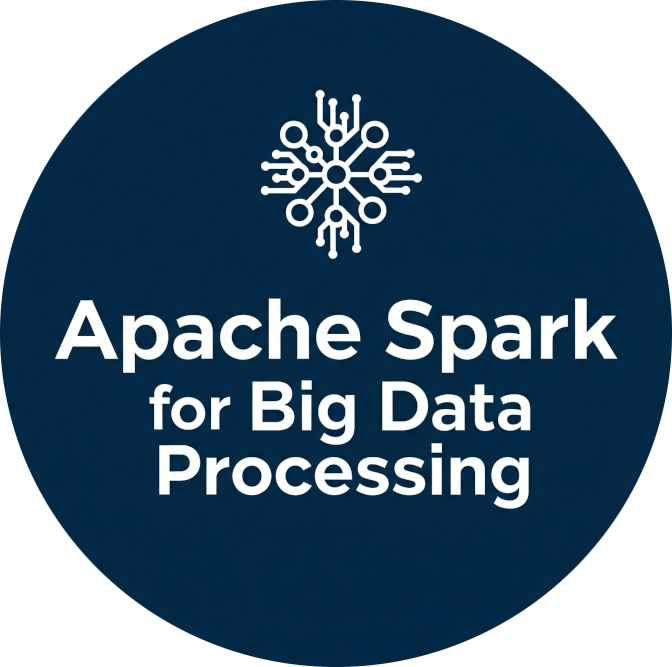AS-201

| Formats: | Asynchronous |
| Blended | |
| Online | |
| Onsite | |
| Part-time | |
| Level: | Intermediate |
| Prerequisites: | |
| Recommended Knowledge | |
| Intermediate Programming Knowledge. | |
| Solid SQL Skills. | |
| Basic Big Data Concepts. | |
| Fundamentals of Big Data | |
Formats: We offer our training content in a flexible format to suit your needs. Contact Us if you wish to know if we can accommodate your unique requirements.
Level: We are happy to customize course content to suit your skill level and learning goals. Contact us for a customized learning path.
Apache Spark for Big Data Processing (AS-201)
Accelerating Analytics and Machine Learning at Scale
In the realm of Big Data, processing massive datasets efficiently and at speed is paramount. While traditional systems falter under the sheer volume and velocity of modern data, **Apache Spark** emerges as the undisputed leader, offering a unified, high-performance engine for large-scale data processing, analytics, and machine learning. Its ability to handle batch, streaming, and interactive workloads with incredible speed has made it a cornerstone of modern data architectures globally.
This **Apache Spark for Big Data Processing** course from Big Data Labs is designed for data engineers, data scientists, and developers in South Africa who are ready to harness Spark's power. Dive deep into its core APIs, learn to build scalable data pipelines, perform complex analytics, and develop powerful machine learning models, transforming your organisation's data capabilities.
Target Audience
This course is ideal for technical professionals who need to process, analyse, and derive insights from large datasets:
Data Engineers & Big Data Developers
Building and optimising large-scale data processing pipelines and ETL workflows.
Data Scientists & Machine Learning Engineers
Leveraging Spark's capabilities for scalable data analysis and ML model development.
Solution Architects
Designing robust and performant big data solutions using the Spark ecosystem.
Data Analysts
Who need to perform advanced analytics on very large datasets beyond traditional tools.
Prerequisite Skills
To gain the most from this practical, hands-on course, participants should have:
- Intermediate Programming Knowledge: Experience with Python or Scala is strongly recommended, as labs will be conducted in one of these languages.
- Solid SQL Skills: Familiarity with writing and optimising SQL queries.
- Basic Big Data Concepts: A foundational understanding of distributed computing and Big Data challenges (e.g., equivalent to our BD-101: Fundamentals of Big Data course).
What One Will Learn (Learning Outcomes)
Upon completion of this course, you will be able to:
- Understand Spark Architecture: Grasp the core components, execution flow, and cluster modes.
- Master Spark Core APIs: Effectively use RDDs, DataFrames, and Spark SQL for data manipulation and analysis.
- Implement Batch & Streaming Jobs: Build scalable applications for both historical and real-time data processing.
- Develop Machine Learning Pipelines: Leverage Spark MLlib for scalable machine learning model development.
- Optimise Spark Applications: Apply performance tuning techniques to ensure efficient resource utilisation and faster execution.
- Understand Spark Deployment Strategies: Grasp the principles for deploying Spark on various cluster managers and cloud platforms.
Target Market
This course is designed for companies and sectors in **South Africa** that handle vast amounts of data and seek to accelerate their data processing and analytical capabilities:
Large Enterprises
Seeking to modernise their data infrastructure and analytics platforms.
Financial Institutions
For risk analysis, fraud detection, and high-volume transaction processing.
Telecommunications
For network optimisation, customer behaviour analysis, and big data monetisation.
Logistics & Supply Chain
For route optimisation, demand forecasting, and operational efficiency.
E-commerce & Retail
For personalised recommendations, inventory management, and market basket analysis.
Course Outline: Apache Spark for Big Data Processing
This comprehensive course covers the essential components and advanced features of Apache Spark, empowering you to process, analyse, and derive insights from vast datasets.
Module 1: Introduction to Apache Spark
- What is Apache Spark? History, motivation, key features (speed, ease of use, generality, compatibility).
- Spark vs. Hadoop MapReduce: Key differences and advantages.
- Spark's Unified Analytics Engine: Batch, Streaming, Machine Learning, Graph processing.
- Spark Architecture: Driver, Executors, Cluster Manager (YARN, Mesos, Standalone).
Module 2: Resilient Distributed Datasets (RDDs)
- Introduction to RDDs: Immutability, fault-tolerance, distributed nature.
- RDD Operations: Transformations (map, filter, flatMap, reduceByKey, groupBy etc.) and Actions (collect, count, saveAsTextFile, take).
- Pair RDDs and their operations.
- RDD Persistence (caching, checkpointing).
Module 3: Spark SQL & DataFrames
- Introduction to Spark SQL: Structured data processing.
- DataFrames: Concepts, advantages over RDDs for structured data.
- Creating DataFrames (from RDDs, JSON, CSV, Parquet).
- DataFrame Operations: Selection, Filtering, Grouping, Joins.
- User-Defined Functions (UDFs).
- Interacting with external data sources (JDBC, Hive, etc.).
Module 4: Working with Structured Data Formats
- Understanding Parquet, ORC, Avro: Why these formats are crucial for Big Data.
- Reading and Writing DataFrames to various formats.
- Optimizations: Partitioning, Bucketing for improved query performance.
Module 5: Spark Streaming for Real-time Analytics
- Introduction to Spark Streaming: D-Streams, micro-batch processing.
- Sources (Kafka, Flume, HDFS) for streaming data ingestion.
- Transformations and Output Operations specific to streaming data.
- Fault Tolerance in Spark Streaming.
Module 6: Machine Learning with MLlib
- Introduction to Spark MLlib: Scalable machine learning library.
- Key MLlib components: Pipelines, Transformers, Estimators for structured ML workflows.
- Common ML algorithms: Regression, Classification, Clustering (conceptual overview and Spark implementation examples).
- Feature Engineering with Spark for preparing data for models.
Module 7: Spark Deployment & Performance Tuning
- Deployment Modes: Local, Standalone, YARN, Mesos, Kubernetes.
- Resource Allocation: Configuring cores and memory for optimal performance.
- Performance Tuning Techniques: Shuffling, broadcasting, parallelism, proper caching strategies.
- Monitoring Spark Applications (Spark UI) for identifying bottlenecks.
Module 8: Advanced Topics & Ecosystem Integration
- Graph Processing with GraphX (conceptual overview).
- Spark with Delta Lake / Apache Hudi / Apache Iceberg (conceptual introduction to Data Lakehouse formats).
- Integration with Cloud Services (Databricks, AWS EMR, Azure Synapse, GCP Dataproc).
- Best Practices for Spark Development and large-scale deployments.